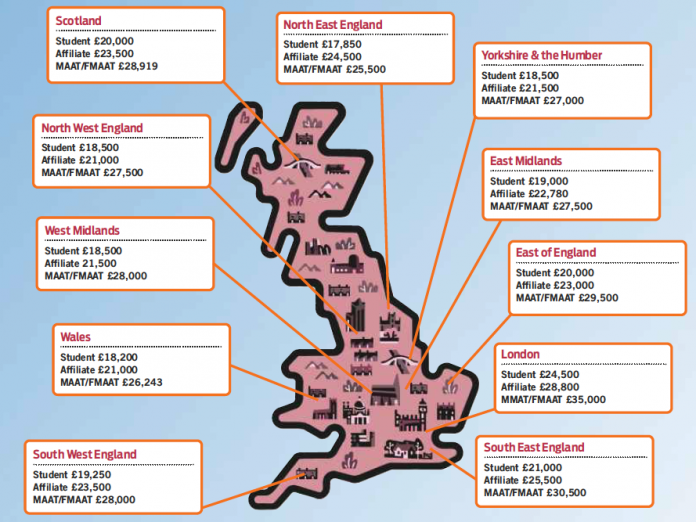The latest AAT salary survey is out and it makes for some interesting reading. At the professional level you find a gender pay gap, with AAT male members earning 5% more than women. This is up on the 2% gap in 2017.
However, at student and affiliate levels, the reverse is true, and women have a higher average salary. Women students are, for example, earning £1,500 more than their male fellow studiers. They are taking home on average £20,000 compared with £18,500 being pocketed by the men.
When it comes to average salaries the North East is again (as in 2017) bottom for students and professional members. Wales is the lowest paying region for affiliates.
London, not surprisingly, remains the top paying area at all levels. The survey points out that there is a 37% difference in salaries between the highest and lowest regions.
The AAT has also worked out the average salary by age. Those aged 16 to 18 are paid just £10,738. For 19 to 24 year-olds the average salary is £18,000. Moving on to 25 to 34 year-olds, salaries move up to £23,005. Those aged 35 to 44 are paid £26,000, and you finally get to £30,000 aged 45 to 54.
If you are following the money then the top paying industry for AATs is the not-for-profit sector, where the average salary is £25,179. This compares with private sector practice salaries of £20,000.
In the past year some 33% of AAT members received a bonus. This is up 1% from 32% in 2017. The average bonus was around 3% of the overall salary for students, and 4% for MAATs and 5% for FMAATs. For the 31% of students who did get a bonus the average they got was £500. Affiliates got slightly more – £650.
The survey found a clear link between job satisfaction and salary. Those who have seen their salary increase in the past year are more likely to indicate high levels of job satisfaction. In all, 76% of members say they are ‘very’ or ‘quite’ satisfied with their current job (down 1% on last year).
It was also good to see job security levels were up. These have been gradually increasing since 2011 when 74% of non-AAT Licensed Accountants felt very or quite secure. Today that figures is 85%.
When asked what company benefit they ‘preferred’ from a list of 14, the top pick was flexi-time. This was followed by private health care and paid time off to study.
Members’ career plans for 2019 remain almost identical to previous years, with 51% saying they plan to stay put. Some three-quarters plan to stay with their current employer, either in the same job or seek promotion.
However, more students and affiliates are planning a move. Just 43% of professional students said they expect to be with the same employer in a year’s time.




